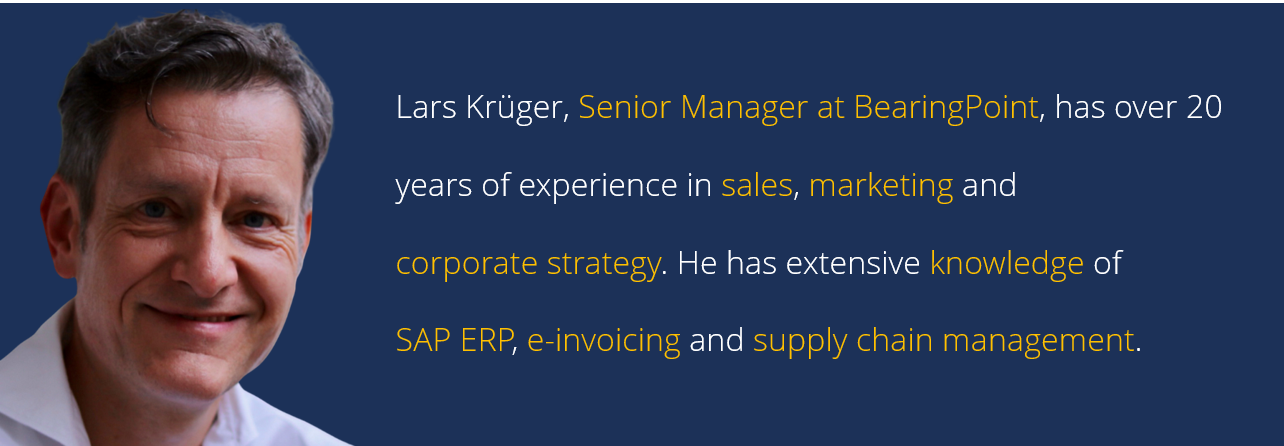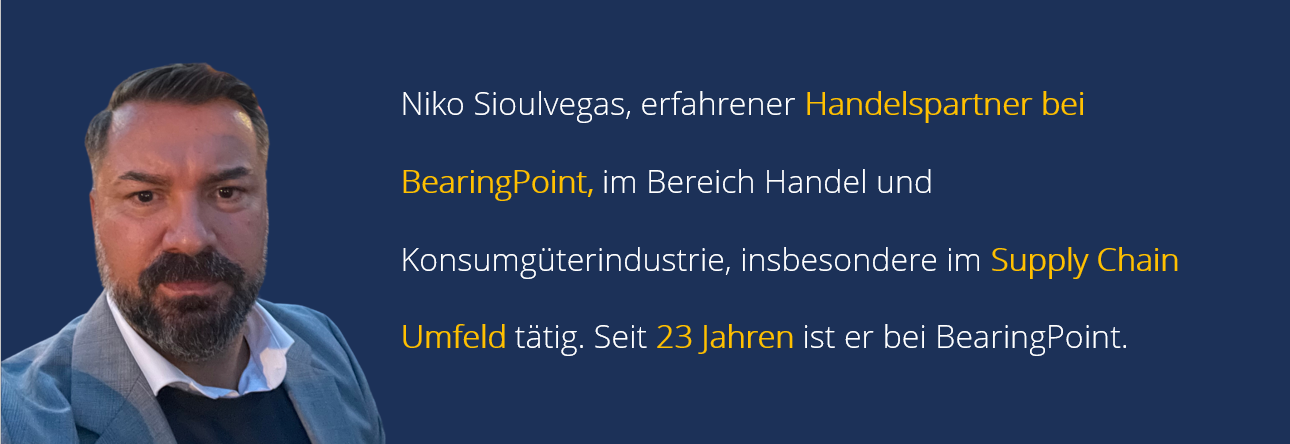Existing customer? Login
Interview
February 7th, 2024
ERP transformation and value management - Exclusive interview with Lars Krüger and Niko Sioulvegas from BearingPoint
 Eros Vecchio
Eros Vecchio
Welcome to our interview today!
We are pleased to welcome Niko Sioulvegas, Partner, as well as Lars Krüger, Senior Manager Business Development at
.png)
BearingPoint is an internationally operating management and technology consulting firm with over 6.000 employees. Our discussion will focus on transformations in the ERP environment, with a special emphasis on the intriguing concept of Value Management.
Lars, could you provide us with insights into BearingPoint's current priorities and projects, particularly in the area of ERP transformations and Value Management?
Lars:
BearingPoint is fundamentally industry-agnostic. In our domain, we concentrate on trade as well as the consumer goods and luxury industries. To remain competitive in this segment, companies must continually question and adapt their business models. This has implications across all aspects of a company, including IT infrastructure and solutions, especially in ERP transformations, particularly with SAP. We adopt a holistic approach to transformation, tightly integrating business processes with organization and IT. We leverage our expertise in individual processes, best practices from numerous implemented projects, and extensive experience in IT project execution. We critically evaluate economic benefits, balance trends against strategy, and in pre-workshops, prepare stakeholders to understand the concept of Value Management, including KPIs and identifying value drivers. In subsequent workshops, we work with stakeholders to identify and structure KPIs and value drivers. Results must be compared with industry benchmarks and, notably, with the company's current values.
Want to learn more about how SCALUE's solution can help you optimize your procurement?
The project goal is then transferred to a Scope Statement. In a follow-up session, stakeholders and the management board evaluate, align, and finalize KPIs and value drivers. Each stakeholder is responsible for their goals. We recommend aligning agreed-upon goals with the compensation plan of each stakeholder. Once Value Management is complete and priorities are set, tasks are sorted into encapsulated process areas and divided into small sub-projects. All project tasks from the 'regular' transformation are synchronized with sub-projects in the overall plan. This approach ensures that clients receive a rapid, value-oriented result well before the projected project end date. Optimized solutions can yield tangible benefits, allowing the organization to learn and experience the transformation in manageable stages. Continuous monitoring and control are essential for achieving and confirming expected results.

Contact Information
Lars Krüger | Senior Manager BDM
BearingPoint | Altrottstraße 31 | 69190 Walldorf
+49 17 56 17 42 15 | lars.krueger@bearingpoint.com
LinkedIn Profil | BearingPoint
In the context of ERP transformation and Value Management: How do companies initiate their transformation journey, and what resistance do they encounter? What specific practical tips do you recommend to overcome team resistance and foster a positive dynamic for change?
Niko:
We often start with a comprehensive analysis of clients' current processes and goal definition. Resistance can stem from uncertainty about change or fear of the unknown. Practical tips we advise our clients include early involvement of employees, in addition to all relevant stakeholders, clear and open communication about the benefits of transformation, providing training and education to alleviate fears, and creating an environment where feedback and suggestions are welcomed. This approach must be endorsed and demonstrated by management. When everyone feels understood and involved, they contribute, fostering a positive momentum that aids successful project implementation.
Value Management is a key factor in ERP transformations. How do you define "Value Management" in this context? Could you illustrate the value in measurable terms with an example?
Lars:
In this context, Value Management ensures that the transformation delivers clear business value, whether through cost savings, efficiency gains, or improved business processes. Examples of measurable results could include:
• Optimized profitability (supplier negotiations, inventory, margin)
• Inventory optimization in each sales channel
• Acceleration of roll-outs
• Acceleration of user adoption
• Reduction of IT and total operating costs
• Reduction of training and project instruction costs
As mentioned, each client pursues different individual goals, which need to be identified, aligned, established, tracked, and potentially adjusted and monitored.

Contact Information
Niko Sioulvegas | Partner BDM
BearingPoint | Speicherstrasse 1 | 60327 Frankfurt am Main
+49 69 13 02 24 507 | nikolaos.sioulvegas@bearingpoint.com
LinkedIn Profil | BearingPoint
Based on your practical observations, what impact have you seen if companies do not follow the approach of BearingPoint in their ERP transformations?
Niko:
This cannot be answered categorically, as there are different transformation approaches tailored with the client. Ultimately, it is an individual case examination with a variety of parameters interacting in a transformation project, influencing each other differently, potentially leading to an undesired outcome. Establishing a project infrastructure that allows transparent, open, and real-time communication is crucial. Deviations should be immediately apparent to discuss, approve, and initiate countermeasures with relevant stakeholders. This necessitates a partnership on equal footing with the client to handle situations professionally, even in critical circumstances. We have been brought into ongoing transformation projects in the past that have figuratively gone off the rails in certain areas. Through these firefighting interventions, based on our experience and the use of proven methodologies, we have steered the project or sub-project back on course.
That concludes the first part of our interview with Niko Sioulvegas and Lars Krüger. In the second part, we will look at other exciting topics in the field of ERP transformations and value management. Learn more about best practices, challenges and future prospects in this dynamic area. Stay tuned for more insights and expert advice from Niko Sioulvegas and Lars Krüger.

How SCALUE can help you? Schedule a free demo now!
Learn more on our blog: Get More Insights
Follow us on LinkedIn: Get more Content